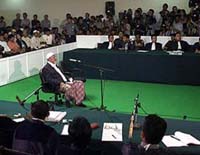
An Indonesian court jailed Muslim cleric Abu Bakar Bashir for four years on treason charges Tuesday, but said the prosecution had failed to prove he led the Jemaah Islamiah network blamed for bombings in Southeast Asia.
The prosecution had demanded a 15-year sentence. The case was widely seen as a test of the willingness of the world's most populous Muslim nation to crack down on radical Islam.
Risk and political analysts described the sentence as light and one predicted it would make the United States think twice before handing over suspected Jemaah Islamiah operational commander Hambali for trial in Indonesia.
Bashir, a 65-year-old preacher and educator who has repeatedly rejected all charges against him, said he would appeal and urged his supporters to remain calm.
"I cannot accept this, therefore I will appeal," he said soon after sentencing, his voice rising.
"I ask you to remain orderly, and be careful of provocateurs from America," he told his supporters who shouted "Allahu Akbar" (God is Greatest).
The panel of five judges, relying heavily on his association with key members of the militant Jemaah Islamiah group, convicted Bashir of participating in acts of treason.
But judges rejected a central part of the prosecution case when they ruled he had not necessarily led the group or plotted to topple Indonesia's secular government.
"The panel has an opinion that Abu Bakar Bashir has not been proven as the leader of Jemaah Islamiah," said presiding judge Muhammad Saleh.
Officials link JI with Osama bin Laden's al Qaeda, the group blamed by Washington for the September 11, 2001, attacks on the United States.
"Members of Jemaah Islamiah conducted actions which the defendant, Abu Bakar Bashir, had knowledge of. Moreover, he approved several actions, including military training in the Southern Philippines and Afghanistan," Saleh told the court.
Investigators have also linked the group to last October's Bali bomb blast, which killed 202 people, most of them foreign tourists, and a car bomb attack on a Jakarta hotel that killed 12 people on August 5.
"SLAP ON THE WRIST"
Ken Conboy, head of RMA Indonesia, a Jakarta-based security risk company, described the verdict as a "bit underwhelming."
"I think a lot of people, they were looking at this as a litmus test to see how serious the government was. Four years, considering he'll probably get (time) off for good behavior, is more or less a glorified slap on the wrist," he said.
Zachary Abuza, a counter-terrorism specialist at Simmons College in the United States and an expert on Jemaah Islamiah, said Washington would not be pleased.
"The Americans are going to be very angry," he said. "I think it really might make the Americans pause when they think about turning over someone like Hambali to them."
While Indonesian authorities have been vigorous in their pursuit of Bali bombing suspects -- one of whom has already been sentenced to death -- none has the public profile of Bashir.
Bashir was charged with treason linked to church bombings that killed 19 people three years ago and an aborted plot to kill President Megawati Sukarnoputri when she was vice president.
"Based on the facts, we can conclude every JI action needs the blessing of the defendant as its emir (chief)," prosecutors said when they asked for the 15-year sentence.
At no stage, however, was Bashir, who repeatedly denounced the trial as a set-up and denied all knowledge of Jemaah Islamiah (JI), directly implicated in the Bali bombing or the Jakarta hotel blast.
Supporters of Bashir, who has campaigned openly for the establishment of Islamic law in Indonesia, crammed into the court and milled about outside at the start of the day.
Police with water cannon stood by.
Bashir, wearing a white cap and shawl over a black jacket and a sarong, urged supporters before proceedings began to stay calm.
"Believe me, we will win, as long as we uphold God's law," he said into a microphone when the panel of judges allowed him to make a statement. His supporters dispersed peacefully after the hearing.
(China Daily September 3, 2003)
|

